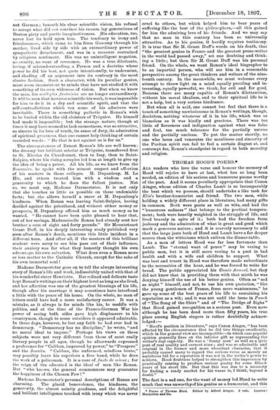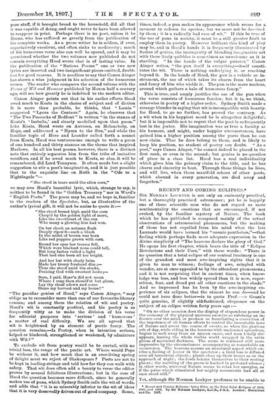THOMAS HOOD'S POEMS.* ALL readers who love the verse and
honour the memory of Hood will rejoice to have at last, what has so long been needed, an edition of his serious and humorous poems worthy of the poet. And it seems peculiarly appropriate that Canon Ainger, whose edition of Charles Lamb is so incomparably the best which we possess, should undertake a like task for Elia's brother-humourist and friend. The two men, while holding a widely different place in literature, had many gifts in common. Both were poets as well as wits, and had the "humorous sadness" that belongs to the poetical tempera- ment ; both were heavily weighted in the struggle of life, and lived bravely in spite of it ; both had the freedom from jealousy and the admiration of what is great and good which mark a generous nature ; and it is scarcely necessary to add that the large jests both of Hood and Lamb have a far deeper source than the witticisms which enliven the dinner-table.
As a man of letters Hood was far less fortunate than Lamb. The "eternal want of pence" may be vexing to public men, but it is still more vexing to a poet in bad health and with a wife and children to support. What was best and truest in Hood was therefore made subordinate to the necessities of the hour, and he was forced to write for bread. The public appreciated his Comic Annual, but they did not know that in providing them with that mirth he was denying himself the use of his better genius. Often as "sad as night" himself, and not., to use his own quotation, "like the young gentlemen of France, from mere wantonness," he gave up some of the best years of his life to sustaining his reputation as a wit; and it was not until the issue in Punch of "The Song of the Shirt" and of "The Bridge of Sighs" that Hood gained recognition as a serious poet. Even now, although he has been dead more than fifty years, his true place among English singers is rather doubtfully acknow- ledged:— " Hood's position in literature," says Canon Ainger, "has been affected by the circumstance that he did two things excellently,
which in the general view are incompatible—in which case popular opinion generally fixes on the inferior gift as representing the writer's real capacity. He was a 'funny man' as well as a lyric poet of real quality and earnest aims ; and was so admirable and original in the former and more abundant character, that it probably caused many to regard the serious verse as merely an ambitious bid for a reputation it was not in the writer's power to achieve. Hood doubtless helped to strengthen this impression by practically ceasing to produce serious poetry for some fifteen years of his short life. But that this was due to a necessity for finding a ready market for his wares is, I think, beyond a doubt."
The fact is a sad one, for the want of money led Hood to write much that was unworthyof his genius as a humourist, and this
• Poems of Thomas Hood. Edited by Alfred Ainger. 2 vols. London: Macmillan and Co.
poor stuff, if it brought bread to the household, did all that it was capable of doing, and ought never to have been allowed to reappear in print. Perhaps there is no poet, unless it be Burns, who has suffered so greatly from the publication of his complete works. As a prose writer he is seldom, if ever, superlatively excellent, and often sinks to mediocrity ; much of his humorous verse also can well be spared, and it may be questioned whether the two volumes now published do not contain everything Hood wrote that is of lasting value. In the publication of the "Serious Poems" one or two new lyrics are inserted and two insignificant pieces omitted, doubt- less for good reasons. It is needless to say that Canon Ainger has shown a wise judgment in his selection of the humorous verses. The reader who compares the second volume with the :Poems of Wit and Humour published by Moron half a century
ago, will see how greatly he is indebted to the modern editor. Canon Ainger points out that in his earlier efforts Hood owed much to Keats in the choice of subject and of diction
It is more than probable, he thinks, that " Lamia " suggested "Lyons the Centaur." Again, he observes that "The Two Peacocks of Bedfont " is written "in the stanza of Keats's Isabella,' and clearly modelled upon that poem." Like Keats, Hood wrote on Autumn, on Melancholy, on Hope, and addressed a "Hymn to the Sun," and while the familiar topic of Hero and Leander called forth a sonnet from Keats, Hood was venturesome enough to write a poem of one hundred and thirty stanzas on the theme that inspired Marlowe. In all his beat poems, however, there is a distinct note that entirely separates him from the tribe of imitative versifiers, and if he owed much to Keats, so also, it will be remembered, did Lord Tennyson. It often needs but a slight suggestion to stir a poet's imagination, and it is just possible
that to the exquisite line on Ruth in the "Ode to a Nightingale "— " She stood in tears amid the alien corn,"
we may owe Hood's beautiful lyric, which, strange to say, is neither to be found in the "Golden Treasury" nor in Ward's "English Poets." The poem may be, and we hope is, familiar
to the readers of the Spectator, but, as illustrative of the author's lyrical gift, it will not be amiss to quote it :— " She stood breast high amid the corn Clasp'd by the golden light of morn, Like the sweetheart of the sun Who many a glowing kiss had won.
On her cheek an autumn flush Deeply ripen'd—such a blush In the midst of brown was born Like red poppies grown with corn.
Round her eyes her tresses fell, Which were blackest none could tell, But long lashes veiled a light That had else been all too bright.
And her hat with shady brim Made her tressy forehead dim ;- Thus she stood amid the stooks, Praising God with sweetest looks ;— Sure, I said, Heav'n did not mean Where I reap thou should'st but glean, Lay thy sheaf adown and come Share my harvest and my home !"
"The peculiar genius of Hood," says Canon Ainger, "may oblige us to reconsider more than one of our favourite literary canons; and among them the relation of wit and poetry. Hood's wit is constantly poetical, and his poetry is so frequently witty as to make the division of his verse
for editorial purposes into 'serious' and 'humorous' a matter of real difficulty. We are all agreed that wit is heightened by an element of poetic fancy. The question remains,—Is Poetry, when in intention serious, helped or hindered, strengthened or weakened, by admixture with Wit ? "
To exclude wit from poetry would be to curtail, with no trivial loss, the range of the poetic art. Where would Pope be without it, and how much that is an ever-living spring of delight must we reject of Shakespeare ? Poets are not to
be kept in leading-strings and told how far they can walk with safety. That wit does often add a beauty to verse the editor proves by several felicitous illustrations ; but in the case of Hood the question becomes more difficult, since he generally makes use of puns, which Sydney Smith calls the wit of words, and adds that "it is so miserably inferior to the wit of ideas
that it is very deservedly driven out of good company. Some. times, indeed, a pun makes its appearance which seems for a moment to redeem its species ; but we must not be deceived by them ; it is a radically bad race of wit." If this be true of the use of pans in society, it must be a still greater fault to employ them in poetry. However brilliant this kind of play may be, and in Hood's hands it is frequently illuminated by flashes of genius, the incongruity of blending imaginative art with these lively quibbles is sometimes as unwelcome as it is startling. "In the hands of the vulgar punster," Canon Ainger writes, "the pun itself is everything—itself consti- tutes the wit. There is nothing underlying it, or reaching beyond it. In the hands of Hood, the pun is a vehicle or in- strument, the use of which takes its charm from the heart and fancy of him who wields it. The pun is the mere nucleus, around which gathers a halo of humorous fancy."
This is true, and amply justifies the use of the pun when the verse consists of humorous fancies ; but it is, we think, otherwise in poetry of a higher order. Sydney Smith made a strange blunder in saying that wit is incompatible with beauty, for Hood, to go no farther, has proved the contrary. As a wit when in his happiest mood he is altogether delightful ; but it is impossible not to regret that the poet is so frequently lost in the jester. His imagination was as true a faculty as his humour, and might, under happier circumstances, have gained him a higher position among the poets than he can now claim. That he does belong to them, and is likely to keep his position, no student of poetry can doubt. "As a poet," says Canon Ainger, "he cannot indeed be placed in the first rank, or even in the second ; but genius is no question of place in a class list. Hood has a real individuality which gives him the primary claim to the title, and he has charm and sincerity to boot. Through these things he lives, and will live, when those manifold echoes of other poets, which abound in every generation, are died away and forgotten."







































 Previous page
Previous page